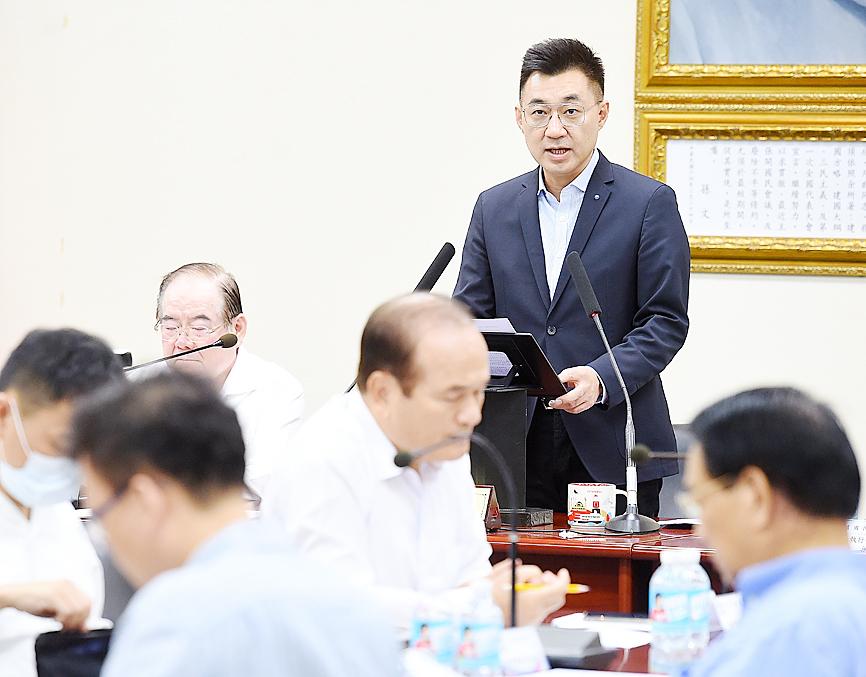Passage of the Hong Kong national security legislation by China’s National People’s Congress Standing Committee is regrettable, the Chinese Nationalist Party (KMT) said in a statement yesterday.
Through the legislation, Beijing has strongly demonstrated its adherence to the “one country” part of “one country, two systems,” but has “severely compressed” the spirit of “two systems,” which is key to maintaining Hong Kong’s development, the party said.
Passage of the legislation would inevitably add greater uncertainty to Hong Kong’s future, it added.

Photo: Chu Pei-hsiung, Taipei Times
The “characteristics of Hong Kong’s development” and its residents’ “space for autonomy” should not be sacrificed just for political reasons, it said.
Beijing should exercise “wisdom” and “self-restraint,” it said, adding that the Chinese government should not intervene in the legislation’s enforcement or interfere with the independence of the territory’s judiciary.
Hong Kong’s legislative and judicial bodies should “firmly defend Hong Kong’s high degree of autonomy, [and] uphold the tradition of freedom,” it said.
Given that the legislation covers offenses committed against Hong Kong by people outside the territory who do not possess permanent Hong Kong residency, the Democratic Progressive Party government should “exhaust all possibilities to guarantee the basic rights and personal safety of Taiwanese,” it said.
The development of “one country, two systems” in Hong Kong has “proven the excellence of the Republic of China’s democratic constitutional system,” and its value to Taiwan, the KMT said.
Beijing should recognize that “one country, two systems” has “no market in Taiwan and that the Republic of China has existed internationally for 109 years,” the KMT said, adding that Beijing should handle disputes over sovereignty across the Taiwan Strait peacefully and through peer-to-peer discussion.
At the weekly meeting of the party’s Central Standing Committee later in the day, KMT Chairman Johnny Chiang (江啟臣) said that the best way to rebuild the “fragile foundation of mutual trust” between Hong Kong and China was for Beijing to return the power to enact national security legislation to Hong Kong, and to “respect the high degree of autonomy of Hong Kong’s judiciary.”
The party opposes that the law expands its jurisdiction to offenses committed against Hong Kong from outside the territory by people who do not possess permanent Hong Kong residency, he said.
He called on President Tsai Ing-wen’s (蔡英文) administration to adopt a “pragmatic” and “effective” approach to assisting Hong Kongers, rather than “mere slogans.”
The KMT cannot accept Chinese President Xi Jinping’s (習近平) proposal of a “one country, two systems” model in Taiwan, Chiang said.
“Today’s Hong Kong will not become tomorrow’s Taiwan,” he added.

Taiwan is stepping up plans to create self-sufficient supply chains for combat drones and increase foreign orders from the US to counter China’s numerical superiority, a defense official said on Saturday. Commenting on condition of anonymity, the official said the nation’s armed forces are in agreement with US Admiral Samuel Paparo’s assessment that Taiwan’s military must be prepared to turn the nation’s waters into a “hellscape” for the Chinese People’s Liberation Army (PLA). Paparo, the commander of the US Indo-Pacific Command, reiterated the concept during a Congressional hearing in Washington on Wednesday. He first coined the term in a security conference last

Prosecutors today declined to say who was questioned regarding alleged forgery on petitions to recall Democratic Progressive Party (DPP) legislators, after Chinese-language media earlier reported that members of the Chinese Nationalist Party (KMT) Youth League were brought in for questioning. The Ministry of Justice Investigation Bureau confirmed that two people had been questioned, but did not disclose any further information about the ongoing investigation. KMT Youth League members Lee Hsiao-liang (李孝亮) and Liu Szu-yin (劉思吟) — who are leading the effort to recall DPP caucus chief executive Rosalia Wu (吳思瑤) and Legislator Wu Pei-yi (吳沛憶) — both posted on Facebook saying: “I

The Ministry of Economic Affairs has fined Taobao NT$1.2 million (US$36,912) for advertisements that exceed its approved business scope, requiring the Chinese e-commerce platform to make corrections in the first half of this year or its license may be revoked. Lawmakers have called for stricter enforcement of Chinese e-commerce platforms and measures to prevent China from laundering its goods through Taiwan in response to US President Donald Trump’s heavy tariffs on China. The Legislative Yuan’s Finance Committee met today to discuss policies to prevent China from dumping goods in Taiwan, inviting government agencies to report. Democratic Progressive Party Legislator Kuo Kuo-wen (郭國文) said

The Ministry of Economic Affairs has fined Taobao NT$1.2 million (US$36,900) for advertisements that exceeded its approved business scope and ordered the Chinese e-commerce platform to make corrections in the first half of this year or its license would be revoked. Lawmakers have called for stricter supervision of Chinese e-commerce platforms and more stringent measures to prevent China from laundering its goods through Taiwan as US President Donald Trump’s administration cracks down on origin laundering. The legislature’s Finance Committee yesterday met to discuss policies to prevent China from dumping goods in Taiwan, inviting government agencies to report on the matter. Democratic Progressive Party